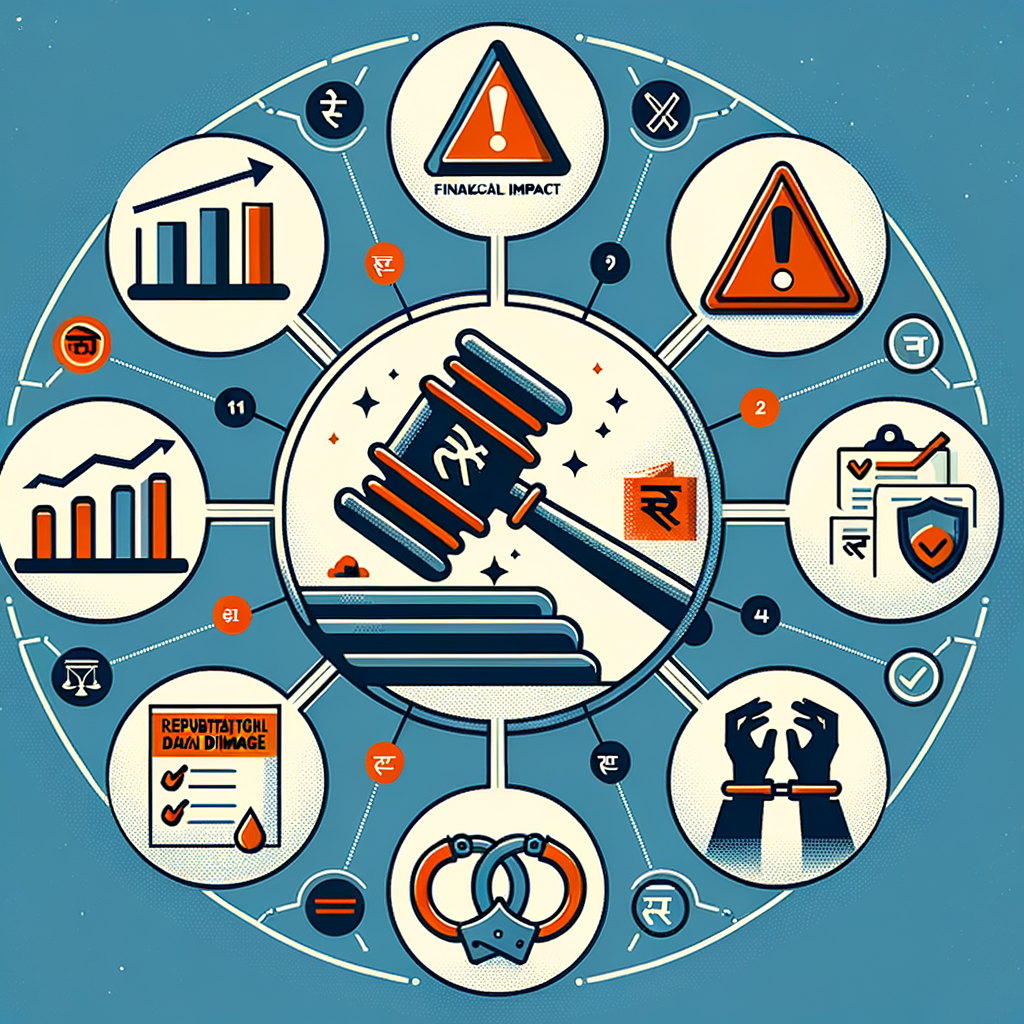What are the legal consequences of inadequate due diligence? A Guide for Indian Businesses
Imagine acquiring a promising small business, only to discover it comes with crippling hidden tax liabilities and pending lawsuits. This nightmare is often the result of one critical oversight: inadequate due diligence. In simple terms, due diligence is the “look before you leap” investigation you conduct before entering into any significant business transaction. Skipping this crucial step is not just a financial risk; it exposes you to severe legal consequences of inadequate due diligence, a reality that is amplified within India’s complex and multi-layered regulatory framework. For business owners and savvy investors alike, understanding these potential pitfalls is the first line of defence in protecting your assets and your reputation. This guide will break down the critical legal implications and provide a clear roadmap to navigate them successfully.
Understanding Due Diligence in the Indian Context
Before diving into the penalties, it’s essential to have a solid grasp of what due diligence truly means for your business in India. It’s not just about ticking boxes; it’s a comprehensive process of investigation and risk assessment that forms the bedrock of any sound business decision. Without this foundational understanding, businesses often underestimate its importance, viewing it as a mere formality rather than a critical shield against future liabilities. This mindset is the first step towards facing significant legal trouble down the line.
What is Due Diligence? A Simple Explanation
At its core, due diligence is a comprehensive appraisal of a business, asset, or investment opportunity to establish its merits, risks, and liabilities before a transaction is finalized. Think of it like getting a full inspection report before buying a house. You wouldn’t purchase a property without checking for structural damage, plumbing issues, or legal ownership disputes. Similarly, in business, due diligence involves scrutinizing financial records, legal compliance, tax history, and operational health to ensure there are no hidden “cracks in the foundation” that could cause the entire structure to collapse after you’ve invested your hard-earned money.
Why is it Critical for Your Business?
Conducting thorough due diligence is non-negotiable for several reasons. Firstly, it is the most effective tool for mitigating risk. It uncovers potential liabilities—be they financial, legal, or operational—allowing you to either renegotiate the terms of the deal, seek indemnities from the seller, or walk away entirely. Secondly, it ensures regulatory compliance by verifying that the target entity adheres to all applicable laws and regulations, saving you from inheriting non-compliance penalties. Finally, it empowers you to make informed financial decisions based on verified facts rather than optimistic projections. This process is absolutely essential in high-stakes transactions such as:
- Mergers and Acquisitions (M&A): To understand the true value and risks of the company you’re buying.
- Private Equity or Venture Capital Investments: To validate the startup’s claims and potential for growth.
- Onboarding High-Value Vendors or Partners: To ensure they are financially stable and legally compliant.
- Real Estate Purchases: To verify title deeds, zoning laws, and environmental compliance.
Key Types of Due Diligence
Due diligence is not a one-size-fits-all process. It is typically broken down into specialized areas to ensure a comprehensive review. The three most critical types for any Indian business are:
- Financial Due Diligence: This involves a deep dive into the financial health of the entity. Professionals verify the accuracy of financial statements, analyse revenue and profit trends, assess the quality of assets, and, most importantly, identify undisclosed debts or contingent liabilities. It answers the question: “Is the business as financially sound as it appears on paper?”
- Legal Due Diligence: This focuses on compliance and legal risks. It involves examining the company’s corporate structure, licenses, permits, employee contracts, intellectual property rights, and any ongoing or potential litigation. This is crucial for understanding due diligence laws in India, as it checks for adherence to regulations like the Companies Act, Labour Laws, and environmental laws, a process detailed in guides on Navigating Legal Compliance for Startups in India.
- Tax Due Diligence: This review scrutinizes the target’s tax compliance history. Experts review past income tax returns, GST filings, and other indirect tax payments to ensure all obligations have been met. It helps uncover any past tax evasion or non-compliance that could result in significant future liabilities for the new owner. You can cross-reference information with official portals like the Income Tax Department and the GST Portal.
The Severe Legal Consequences of Inadequate Due Diligence
Failing to conduct proper due diligence is like navigating a minefield blindfolded. The risks are not just financial losses but a cascade of legal troubles that can cripple a business and even expose its leaders to personal liability. The Indian legal system is stringent, and ignorance of a pre-existing issue is rarely accepted as a valid excuse. Understanding these consequences is vital for any entrepreneur or investor looking to operate safely and successfully.
Financial Penalties and Fines
One of the most immediate impacts of poor due diligence is being saddled with unexpected financial penalties. When you acquire a business, you often inherit its liabilities, including those hidden from plain sight. These are direct due diligence consequences for businesses in India. For example, under the Companies Act, 2013, if an acquired company’s financial statements contained misrepresentations, the new directors could face penalties. Similarly, for listed companies, SEBI regulations impose hefty fines for non-disclosure of material information. Perhaps most commonly, under the Income Tax Act, the acquiring entity can be held responsible for the past tax liabilities, interest, and penalties of the business it has purchased, turning a profitable acquisition into a financial drain overnight.
Contractual Liabilities and Voided Agreements
A business transaction is built on a foundation of trust and representations made by both parties. If you enter into an agreement based on false or misleading information that thorough due diligence would have uncovered, you may have legal recourse, but it often involves a long and costly battle. In severe cases, the entire transaction can be declared null and void by a court. More frequently, you may have to file a “Breach of Warranty” claim, suing the seller for providing false assurances or warranties within the purchase agreement. While this can help recover some losses, it is a reactive measure that consumes significant time, energy, and legal fees—all of which could have been avoided by being proactive upfront.
Civil and Criminal Liability for Directors
This is where the consequences become personal and severe. In India, the principle of the “corporate veil” (which separates the company’s identity from its owners) can be lifted in cases of fraud or wilful misconduct. Directors and Key Managerial Personnel (KMP) can be held personally liable for the company’s wrongdoings if it’s proven they acted negligently; the specific Liabilities of Directors and Key Managerial Personnel (KMP) Under the Act can be severe. For instance, if a company is acquired and later found to be a front for money laundering, the new directors could face investigation and potential charges under the stringent Prevention of Money Laundering Act (PMLA). This is one of the most serious due diligence legal issues for companies India has on its books, as it can lead to imprisonment and the seizure of personal assets.
Regulatory Actions and Reputational Damage
Beyond direct financial and legal penalties, inadequate due diligence can attract the unwanted attention of various regulatory bodies. The Registrar of Companies (ROC), the Reserve Bank of India (RBI), or various Environmental Boards can launch investigations, freeze operations, or revoke critical licenses if they discover non-compliance inherited from a previous owner. The fallout from such regulatory actions extends beyond the legal sphere. It causes immense reputational damage, eroding investor confidence, scaring away customers, and making it difficult to secure financing or attract talent in the future. In today’s interconnected world, a damaged reputation can be even more costly to repair than a financial penalty.
Inadequate Due Diligence in Practice: Common Pitfalls
Theoretical risks can sometimes feel distant. To understand the real-world impact, let’s look at some common scenarios where skipping due diligence leads to disastrous outcomes for both businesses and individuals.
Scenario 1: Acquiring a Business with Hidden GST Liabilities
An entrepreneur, let’s call him Rohan, decides to acquire a small manufacturing unit to expand his business. The deal looks fantastic on the surface, with healthy profit margins and a solid customer base. Rohan, eager to close the deal, relies only on the seller’s audited financial statements and forgoes a detailed tax due diligence process. Six months after the acquisition, he receives a notice from the GST department for unpaid taxes, interest, and penalties amounting to crores, stemming from the previous owner’s fraudulent input tax credit claims. Because Rohan is the new owner, the liability is now his. This situation perfectly highlights the legal implications of poor due diligence India‘s robust tax regime can impose, turning a dream investment into a financial nightmare, and underscores the importance of knowing how to avoid common pitfalls leading to GST demand notices.
Scenario 2: Onboarding a Non-Compliant Vendor
A growing e-commerce company decides to partner with a new logistics provider to handle its nationwide deliveries. The provider offers very competitive rates. The company conducts a basic price comparison but fails to perform legal due diligence on the vendor’s labour practices. A few months into the partnership, news breaks that the logistics provider is under investigation for violating minimum wage laws and employing child labour. The e-commerce company’s operations are immediately disrupted as its logistics are frozen. Worse, its brand is now publicly associated with an unethical partner, leading to a customer boycott and severe reputational damage, demonstrating that due diligence is just as crucial for your supply chain as it is for acquisitions.
Scenario 3: For Salaried Individuals – Investing in a Startup
Priya, a salaried professional, has some savings and is excited by the startup boom. A friend introduces her to the founders of a “promising” tech startup seeking angel investment. Impressed by their slick presentation, she invests a significant amount without performing any due diligence. A year later, she discovers the startup has a convoluted ownership structure (cap table), the founders have diluted her equity without her knowledge, and the company’s financials were grossly inflated. Her investment is now worthless, and she has no easy legal recourse. This shows that even for individual investors, basic due diligence—verifying corporate registration, understanding the cap table, and reviewing financial health—is essential to avoid being taken for a ride.
How to Conduct Effective Due Diligence and Avoid Penalties
Now that the risks are clear, the next logical step is to understand how to build a robust due diligence process. While the depth of the investigation will vary with the size and nature of the transaction, a structured approach is key. This involves creating a comprehensive checklist and knowing when the complexity requires bringing in professional expertise.
The Essential Due Diligence Checklist
This checklist provides a starting point for any significant business transaction. It is designed to help you gather the foundational documents needed for a thorough review.
- Corporate Records: Request the Memorandum of Association (MOA), Articles of Association (AOA), Certificate of Incorporation, and all statutory registers. These documents define the company’s purpose and governance structure.
- Financials: Obtain audited financial statements for the last 3-5 years. In addition, ask for all Income Tax and GST returns filed during this period to cross-verify the financial data and check for compliance.
- Legal: Scrutinize all material contracts with suppliers, customers, and employees. Demand a list of all licenses and permits required for operation and verify their validity. Crucially, ask for details of any ongoing, pending, or past litigation.
- Assets & Intellectual Property (IP): Verify the title deeds of all real estate properties owned by the company. If the business has valuable IP, check the registration certificates for trademarks, patents, and copyrights to ensure they are legally owned and protected.
When to Seek Professional Help
While this checklist is a great start, the sheer complexity of Indian business and tax law means a do-it-yourself approach is often insufficient and risky for major transactions. Professionals like Chartered Accountants, Company Secretaries, and Lawyers are trained to spot red flags that a business owner might miss. They understand how to read between the lines of financial statements and legal documents. The cost of professional due diligence is a fraction of the potential legal consequences of inadequate due diligence. TaxRobo’s team of legal and financial experts can help you navigate this process seamlessly, providing a comprehensive report that empowers you to make a truly informed decision.
Conclusion
Due diligence is not an optional formality or a bureaucratic hurdle; it is a fundamental pillar of responsible business management and investment strategy. As we have seen, the risks of neglecting this process are profound, ranging from crippling financial penalties and voided contracts to personal liability for directors and irreparable reputational harm. In India’s dynamic but complex regulatory environment, a proactive and thorough investigation is your best insurance against hidden liabilities. In conclusion, understanding and mitigating the legal consequences of inadequate due diligence is fundamental to safe and successful business operations in India.
Don’t leave your investments and business to chance. Protect yourself from hidden liabilities. Contact TaxRobo today for a comprehensive due diligence consultation.
Frequently Asked Questions (FAQs)
Q1: What is the difference between legal and financial due diligence?
A: Financial due diligence focuses on verifying the financial health and accuracy of records (balance sheets, P&L statements, cash flow). Its goal is to confirm the company’s economic value. Legal due diligence, on the other hand, focuses on compliance with laws, contracts, litigation history, and corporate structure to identify legal risks and liabilities. Both are essential and interconnected, as legal issues often have financial implications.
Q2: Can I do due diligence myself for my small business?
A: For very small transactions, like hiring a freelancer or buying office equipment, basic checks on your own may suffice. However, for any significant decision like buying property, taking a large loan against assets, acquiring another business, or making a substantial investment, professional help is crucial. The potential legal implications of poor due diligence India are too high to risk it based on an incomplete or amateur assessment.
Q3: How long does a typical due diligence process take in India?
A: The timeline varies greatly based on the complexity and size of the transaction. A simple due diligence on a small vendor might take a few days to a week. A comprehensive due diligence for a mid-sized company acquisition can take several weeks to a few months, depending on the cooperation of the other party and the complexity of their operations and records.
Q4: What is the single biggest red flag to watch out for during due diligence?
A: While there are many red flags, the most significant one is an unwillingness or repeated hesitation from the other party to share information and documents. Transparency is the cornerstone of a good faith transaction. If a seller or potential partner is evasive, it’s often because they have something to hide. Other major red flags include inconsistent financial records, undisclosed litigation, and overly complex, unclear ownership structures.



